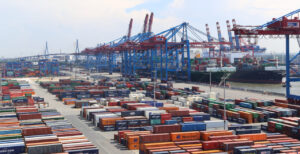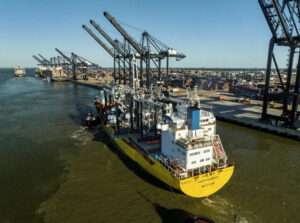A new fire safety study by Survitec, a provider of Survival Technology solutions, has revealed issues with the existing firefighting methods used to extinguish methanol-based fires on conventional vessels.
This follows extensive comparative fire tests on dual-fuel marine engines using diesel oil (DO) and methanol, carried out amid growing interest in methanol as an alternative marine fuel.
Methanol is a methyl alcohol (CH3OH) that burns in a completely different way than hydrocarbon fuels and has a much lower flashpoint of 12°C (54°F). However, while there are established fire safety regulations and testing standards for diesel fuels, clear test protocols for alcohol-based fuels such as methanol and ethanol have yet to be developed.
The Survitec tests found that while water mist systems are highly effective in absorbing heat and displacing oxygen on diesel fires, they do not produce the same results on methanol fires.
“Our tests confirm that traditional water mist fire suppression mechanisms do not perform as expected on methanol pool fires and methanol spray fires. A completely different approach is required if these ships are to remain safe,” said Michał Sadzyński, Product Manager, Water Mist Systems, Survitec.
“We believe this is a high-risk situation that needs immediate action,” stressed Sadzyński. “Methanol fires are far more aggressive than fires involving traditional hydrocarbon fuels. Methanol fires have different physicochemical properties and so they cannot be extinguished as easily or with the same approach.”
This finding indicates that if existing vessels are retrofitted to run on methanol, they would need to overhaul and redesign their fixed fire-fighting arrangement completely.
For bilge areas, statutory rules formulated in IMO MSC.1/Circ.1621 establish a requirement for an approved alcohol-resistant foam system for ships running on methanol. For the first time, a fixed, low expansion foam system is mandatory under the rules when it comes to protecting machinery space bilges.
The stark conclusion of the investigation arrives at a time of increasing orders for methanol-fuelled ships. The greener fuel is seen as a panacea to meeting the industry’s emissions abatement targets, and forecasts predict accelerated adoption rates.
Orders for methanol-fuelled newbuilds increased by 9 per cent in the last 12 months, 2 per cent more than those for LNG-fuelled ships. Analysts suggest the methanol-fuelled fleet will account for 20mgt by 2028.
READ: Two die in Port Houston containership fire
“Our tests demonstrate that standard discharge devices do not properly extinguish methanol pool fires in the confined bilge space,” said Maciej Nieścioruk, Product Manager, Foam Systems, Survitec.
“It is crucial to deliver properly expanded foam on the methanol pool fire and this is not an easy task within such a narrow space where throw length is limited.”
“MSC.1/Circ.1621 provides us with a starting guideline but it is very general and therefore open to interpretation. Moreover, methanol compliance for Local Application Firefighting (LAFF) systems is not yet covered.
“As an industry, we need to come together and develop comprehensive and robust fire test standards and safety rules tailored to methanol’s unique properties.”









